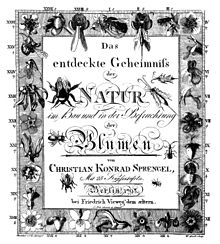Das entdeckte Geheimnis der Natur im Bau und in der Befruchtung der Blumen

Das entdeckte Geheimnis der Natur im Bau und in der Befruchtung der Blumen (The Secret of Nature in the Form and Fertilisation of Flowers Discovered) by
The fact that flowers have a sexual role had been recognised earlier by

Darwin's new evolutionary ideas rejected the idea that species characters were invariable. He was aware from animal husbandry that inbreeding could lead to changes, but as wild species usually remained homogenous, he thought that species were kept the same by natural cross-fertilisation. It would also give the evolutionary advantage that favourable changes were spread through a reproductive community, but this was contradicted by the common supposition that plants were usually self-fertilising. Sprengel's work suggested answers to this problem, and Darwin adopted Sprengel's methods in investigating various plants, particularly orchids.[4] He mentioned Sprengel in an 1841 letter to The Gardeners' Chronicle.[5] and made reference to Sprengel's research in his unpublished 1844 Essay on the origin of species.[6] A year later, Darwin wrote to his friend the botanist Joseph Dalton Hooker about the need for insects to pollinate flowering plants; "have you ever seen C. Sprengels curious book on this subject; I have verified many of his observations: doubtless he rides his theory very hard."[7]
Notes
- ^ Vogel 1996, pp. 44–45
- ^ Darwin 1958, pp. 127–128
- ^ Vogel 1996, pp. 48–56
- ^ Vogel 1996, pp. 56–57
- ^ Darwin Correspondence Project - Letter 607 — Darwin, C. R. to Gardeners' Chronicle, (16 Aug 1841), retrieved 2009-07-20
- ^ Darwin 1909, p. 233
- ^ Darwin Correspondence Project - Letter 889 — Darwin, C. R. to Hooker, J. D., (11–12 July 1845), archived from the original on December 22, 2012, retrieved 2009-07-20
References
- Vogel, Stefan (1996), Barrett, Spencer C. H.; Lloyd, David W. (eds.), Floral biology: studies on floral evolution in animal-pollinated plants, London: Chapman & Hall, pp. 44–60, ISBN 0-412-04341-6
- Darwin, Charles (1909). The Foundations of the Origin of Species. Cambridge: Cambridge University Press. p. 233.
- Darwin, Charles (1958). The Autobiography of Charles Darwin 1809-1882. Edited with Appendix and Notes by his grand-daughter Nora Barlow. London: Collins.
